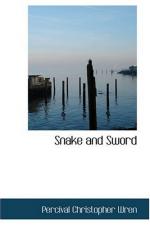“Phwat wid?” anxiously inquired the bereaved Phelim.
“Wot wiv’? Wiv’ callin’ ‘Threes abaht’ after one o’ the Young Jocks,"[16] was the literal reply.
“Begob that same must be a good hand wid his fisties—or was it a shillaleigh?” mused the Irishman.
“’Eld the Helliot belt in Hinjer last year, they say,” continued the Cockney. “Good? Not’arf. I wouldn’t go an’ hinsult the bloke for the price of a pot. No. ’Erbert ’Awker would not. (Chuck us yore button-stick, young ’Enery Bone.) Good? ’E’s a ’Oly Terror—and I don’t know as there’s a man in the Queen’s Greys as could put ’im to sleep—not unless it’s Matthewson,” and here Trooper Herbert Hawker jerked his head in the direction of Trooper Damocles de Warrenne (alias D. Matthewson) who, seated on his truckle-bed, was engaged in breathing hard, and rubbing harder, upon a brass helmet from which he had unscrewed a black horse-hair plume.
Dam, arrayed in hob-nailed boots, turned-up overalls “authorized for grooming,” and a “grey-back” shirt, looked indefinably a gentleman.
Trooper Herbert Hawker, in unlaced gymnasium shoes, “leathers,” and a brown sweater (warranted not to show the dirt), looked quite definably what he was, a Commercial Road ruffian; and his foreheadless face, greasy cow-lick “quiff” (or fringe), and truculent expression, inspired more disgust than confidence in the beholder.
His reference to Dam as the only likely champion of the Heavy Cavalry against the Hussar was a tribute to the tremendous thrashing he had received from “Trooper D. Matthewson” when the same had become necessary after a long course of unresented petty annoyance. Hawker was that very rare creature, a boaster, who made good, a bully of great courage and determination, and a loud talker, who was a very active doer; and the battle had been a terrible one.
The weary old joke of having a heavy valise pulled down on to one’s upturned face from the shelf above, by means of a string, as one sleeps, Dam had taken in good part. Being sent to the Rough-Riding Sergeant-Major for the “Key of the Half Passage” by this senior recruit, he did not mind in the least (though he could have kicked himself for his gullibility when he learned that the “Half Passage” is not a place, but a Riding-School manoeuvre, and escaped from the bitter tongue of the incensed autocrat—called untimely from his tea! How the man had bristled. Hair, eyebrows, moustache, buttons even—the Rough-Riding Sergeant-Major had been rough indeed, and had done his riding rough-shod over the wretched lad).




